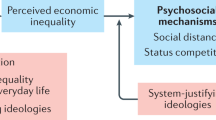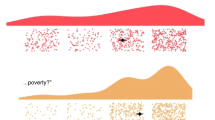Abstract
In this paper we examined the joint effects of perceived economic inequality and legitimacy on ideal economic inequality. We hypothesized that only for those individuals who legitimize inequality, perceived inequality will be positively related to ideal inequality. Conversely, for individuals that do not legitimize inequality, a weaker relation between these variables will be observed. We tested these ideas in two studies. In Study 1, we measured perceived and ideal inequalities (i.e., pay gap) and individual differences in the legitimization of inequality. In Study 2, we measured perceived and ideal inequalities using a novel abacus procedure in which participants had to allocate resources to the different income quintiles, and we then manipulated the legitimacy (vs. illegitimacy) of economic inequality. According to our hypothesis, in both studies we found that when individuals legitimize inequality (vs. when they do not), the relation between perceived and ideal economic inequalities tends to be stronger.




Similar content being viewed by others
Notes
Although more participants agreed to participate in the study, only 275 answered to the three main variables of our study (i.e., perceived gap, ideal gap, and opposition to equality). Given that our goal was to examine the relation among these three variables, only these 275 participants are described in this section.
Forty-three participants did the study at the public library, whereas 232 did it at the bus station. There were no significant differences between these two groups in any of the measured variables (ts < 1.3; n.s.).
This effect size has been calculated considering dependent t test, using the following Web site: http://www.psychometrica.de/effect_size.html.
Sixteen cases were removed from the analyses because these participants answered the abacus measure incorrectly. One participant was considered an outlier (with more than 3 SD over the mean in the ideal inequality abacus measure) and was also skipped in the analyses.
As previously reported, almost a quarter of participants did not understand the instructions. However, in a different study, conducted within a different research line, we found that changing the instructions given to participants made it so that only 2 out of 44 (4.45 %) participants performed the task incorrectly. In the new instructions, we first asked participants to build the most egalitarian society and the most unequal society possible. The experimenter helped those who did not follow the instructions. Then participants were asked to build their perceived and ideal societies, as in Study 2.
The pseudo-Gini index can be computed using the following calculator: economics-files.pomona.edu/cconrad/GiniA.xls. The formula to calculate the Gini coefficient is: \({\text{Gini}} = \left( {\frac{2}{{\mu \cdot n^{2} }} \cdot \sum\nolimits_{k = 1}^{n} {k \cdot W_{k} } } \right) - \frac{n + 1}{n}\). Taking into account that μ is the arithmetic mean of resources (green beads) assigned among the quintiles of the society (the five abacus wooden posts); W k is the amount of resources assigned to each quintile, and it is ranked in ascending order (e.g., k = 1, 2, 3, …, n); and n is the total number of individuals among which the resources are distributed. Considering that we used a fictional society divided into quintiles, n = 5.
References
Alesina, A., Di Tella, R., & MacCulloch, R. (2004). Inequality and happiness: Are Europeans and Americans different? Journal of Public Economics, 88, 2009–2042. doi:10.1016/j.jpubeco.2003.07.006.
Berger, J., Fisek, M. H., Norman, R. Z., & Wagner, D. G. (1998). Formation of reward expectations in status situations. In J. Berger & M. Zelditch (Eds.), Status, power, and legitimacy (pp. 121–153). San Francisco: Jossey-Bass.
Cárdenas, M., Meza, P., Lagues, K., & Yañez, S. (2010). Adaptación y validación de la escala de orientación a la dominancia Social (SDO) en una muestra chilena. Universitas Psychologica, 9, 161–168.
Castillo, J. C. (2011). Legitimacy of inequality in a highly unequal context: Evidence from the Chilean case. Social Justice Research, 24, 314–340. doi:10.1007/s11211-011-0144-5.
CES. (2013). Informe Distribución de la renta en España: desigualdad, cambios estructurales y ciclos (No. 3). Retrieved from http://www.ces.es/documents/10180/526241/Inf0313.pdf.
Delhey, J., & Dragolov, G. (2013). Why inequality makes Europeans less happy: The role of distrust, status anxiety, and perceived conflict. European Sociological Review, 30, 525–535. doi:10.1093/esr/jct033.
Eidelman, S., & Crandall, C. S. (2009). A psychological advantage for the status quo. In J. T. Jost, A. C. Kay, & H. Thorisdottir (Eds.), Social and psychological bases of ideology and system justification (pp. 85–106). New York: Oxford University Press.
Eidelman, S., & Crandall, C. S. (2012). Bias in favor of the status quo. Social and Personality Psychology Compass, 6, 270–281. doi:10.1111/j.1751-9004.2012.00427.x.
EUROSTAT. (2014). Inequality of income distribution. Retrieved from http://ec.europa.eu/eurostat/tgm/graph.do?tab=graph&plugin=1&pcode=tsdsc260&language=en&toolbox=data.
Furnham, A. (1984). The protestant work ethic: A review of the psychological literature. European Journal of Social Psychology, 14, 87–104. doi:10.1002/ejsp.2420140108.
Gijsberts, M. (2002). The legitimation of income inequality in state-socialist and market societies. Acta Sociologica, 45, 269–285. doi:10.1080/000169902762022860.
Hadler, M. (2005). Why do people accept different income ratios? A multi-level comparison of thirty countries. Acta Sociologica, 48, 131–154. doi:10.1177/0001699305053768.
Hayes, A. F. (2013). Introduction to mediation, moderation, and conditional process analysis: A regression-based approach. New York: Guilford Press.
Jencks, C. (2002). Does inequality matter? Daedalus, 131, 49–64.
Jost, J. T., & Banaji, M. R. (1994). The role of stereotyping in system-justification and the production of false consciousness. British Journal of Social Psychology, 33, 1–27. doi:10.1111/j.2044-8309.1994.tb01008.x.
Jost, J. T., Blount, S., Pfeffer, J., & Hunyady, G. (2003). Fair market ideology: Its cognitive-motivational underpinnings. Research in Organizational Behavior, 25, 53–91. doi:10.1016/S0191-3085(03)25002-4.
Jost, J. T., & Thompson, E. P. (2000). Group-based dominance and opposition to equality as independent predictors of self-esteem, ethnocentrism, and social policy attitudes among African Americans and European Americans. Journal of Experimental Social Psychology, 36, 209–232. doi:10.1006/jesp.1999.1403.
Jost, J. T., & van der Toorn, J. (2012). System justification theory. In P. A. M. van Lange, A. W. Kruglanski, & E. T. Higgins (Eds.), Handbook of theories of social psychology (pp. 313–343). London: Sage.
Kawachi, I., Kennedy, B. P., Lochner, K., & Prothrow-Stith, D. (1997). Social capital, income inequality, and mortality. American Journal of Public Health, 87, 1491–1498. doi:10.2105/AJPH.87.9.1491.
Kay, A. C., & Friesen, J. (2011). On social stability and social change: Understanding when system justification does and does not occur. Current Directions in Psychological Science, 20, 360–364. doi:10.1177/0963721411422059.
Kay, A. C., Gaucher, D., Peach, J. M., Laurin, K., Friesen, J., Zanna, M. P., et al. (2009). Inequality, discrimination, and the power of the status quo: Direct evidence for a motivation to see the way things are as the way they should be. Journal of Personality and Social Psychology, 97, 421–434. doi:10.1037/a0015997.
Kelley, J., & Evans, M. D. (1993). The legitimation of inequality: Occupational earnings in nine nations. American Journal of Sociology, 99, 75–125. doi:10.1086/230230.
Kennedy, B. P., Kawachi, I., Prothrow-Stith, D., Lochner, K., & Gupta, V. (1998). Social capital, income inequality, and firearm violent crime. Social Science and Medicine, 47, 7–17.
Kiatpongsan, S., & Norton, M. I. (2014). How much (more) should CEOs make? A universal desire for more equal pay. Perspectives on Psychological Science, 9, 587–593. doi:10.1177/1745691614549773.
Neckerman, K. M., & Torche, F. (2007). Inequality: Causes and consequences. Annual Review of Sociology, 33, 335–357. doi:10.1146/annurev.soc.33.040406.131755.
Norton, M. I., & Ariely, D. (2011). Building a better america-one wealth quintile at a time. Perspectives on Psychological Science, 6, 9–12. doi:10.1177/1745691610393524.
Norton, M. I., Neal, D. T., Govan, C. L., Ariely, D., & Holland, E. (2014). The not-so-common-wealth of Australia: Evidence for a cross-cultural desire for a more equal distribution of wealth. Analyses of Social Issues and Public Policy, 14, 339–351. doi:10.1111/asap.12058.
Oishi, S., Kesebir, S., & Diener, E. (2011). Income inequality and happiness. Psychological Science, 22, 1095–1100. doi:10.1177/0956797611417262.
Osberg, L., & Smeeding, T. (2006). “Fair” inequality? Attitudes toward pay differentials: The United States in comparative perspective. American Sociological Review, 71, 450–473. doi:10.1177/000312240607100305.
Pickett, K., & Wilkinson, R. (2010). The spirit level: Why greater equality makes societies stronger. USA: Bloomsbury Publishing.
Pratto, F., Sidanius, J., Stallworth, L. M., & Malle, B. F. (1994). Social dominance orientation: A personality variable predicting social and political attitudes. Journal of Personality and Social Psychology, 67, 741–763. doi:10.1037/0022-3514.67.4.741.
Samuelson, W., & Zeckhauser, R. (1988). Status quo bias in decision making. Journal of Risk and Uncertainty, 1, 7–59. doi:10.1007/BF00055564.
Shepelak, N. J., & Alwin, D. F. (1986). Beliefs about inequality and perceptions of distributive justice. American Sociological Review, 51, 30–46. doi:10.2307/2095476.
Sidanius, J., & Pratto, F. (2001). Social dominance: An intergroup theory of social hierarchy and oppression. New York: Cambridge University Press.
Son Hing, L. S., Bobocel, D. R., Zanna, M. P., Garcia, D. M., Gee, S. S., & Orazietti, K. (2011). The merit of meritocracy. Journal of Personality and Social Psychology, 101, 433–450. doi:10.1037/a0024618.
Tversky, A., & Kahneman, D. (1974). Judgment under uncertainty: Heuristics and biases. Biases in judgments reveal some heuristics of thinking under uncertainty. Science, 185, 1124–1131. doi:10.1126/science.185.4157.1124.
Uslaner, E. M., & Brown, M. (2005). Inequality, trust, and civic engagement. American Politics Research, 33, 868–894. doi:10.1177/1532673X04271903.
Verwiebe, R., & Wegener, B. (2000). Social inequality and the perceived income justice gap. Social Justice Research, 13, 123–149. doi:10.1023/A:1007545823040.
Wegener, B. (1990). Equity, relative deprivation, and the value consensus paradox. Social Justice Research, 4, 65–86. doi:10.1007/BF01048536.
Acknowledgments
The authors would like to thank the Spanish Ministerio de Economía y Competitividad for a grant to work on these topics (PSI2013-45678-P).
Author information
Authors and Affiliations
Corresponding author
Rights and permissions
About this article
Cite this article
Willis, G.B., Rodríguez-Bailón, R., López-Rodríguez, L. et al. Legitimacy Moderates the Relation Between Perceived and Ideal Economic Inequalities. Soc Just Res 28, 493–508 (2015). https://doi.org/10.1007/s11211-015-0253-7
Published:
Issue Date:
DOI: https://doi.org/10.1007/s11211-015-0253-7




